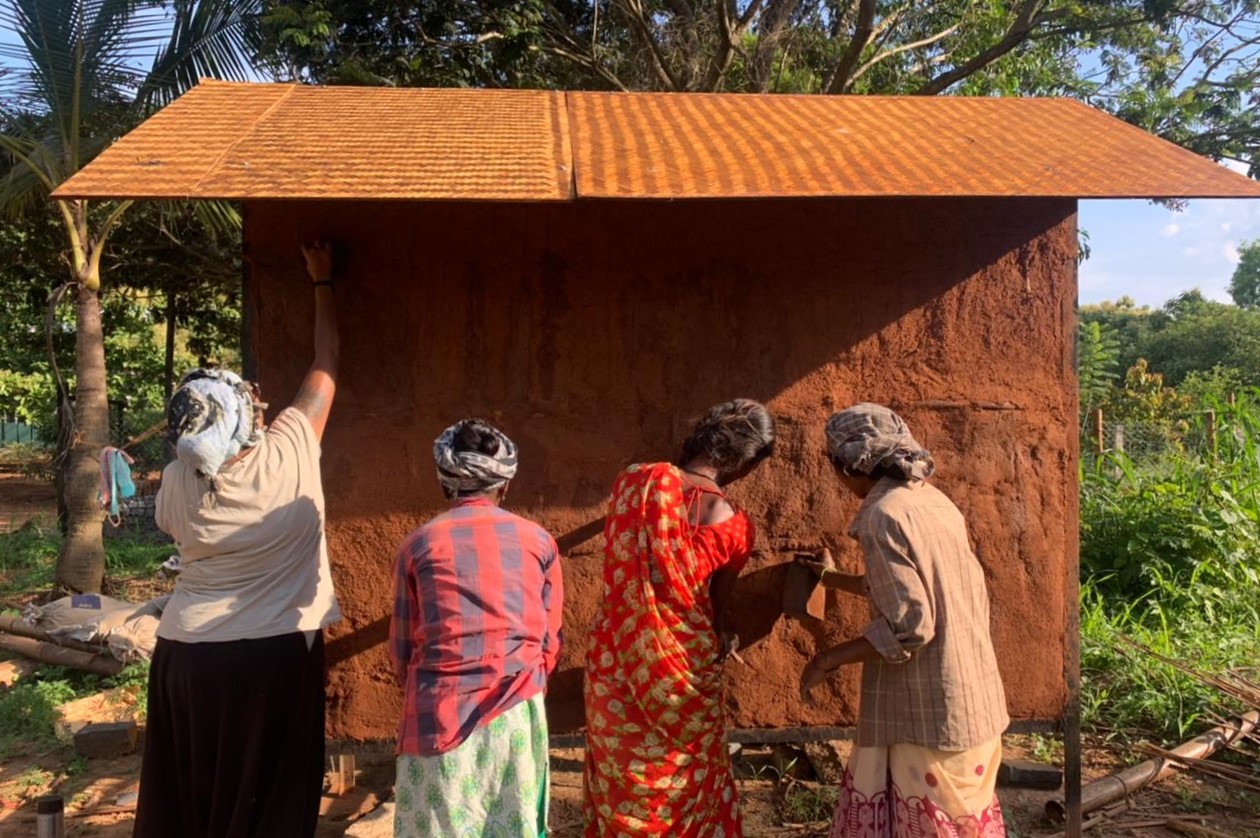Through our Grassroots Grant Programme, INTBAU supports local projects worldwide, connecting them with our network of chapters to advance and adapt building traditions. Masons Ink is an Indian architecture practice with a focus on sustainability, which received a Grassroots grant in 2024. Their work empowers women in India’s construction industry, combining traditional building techniques with sustainable materials.
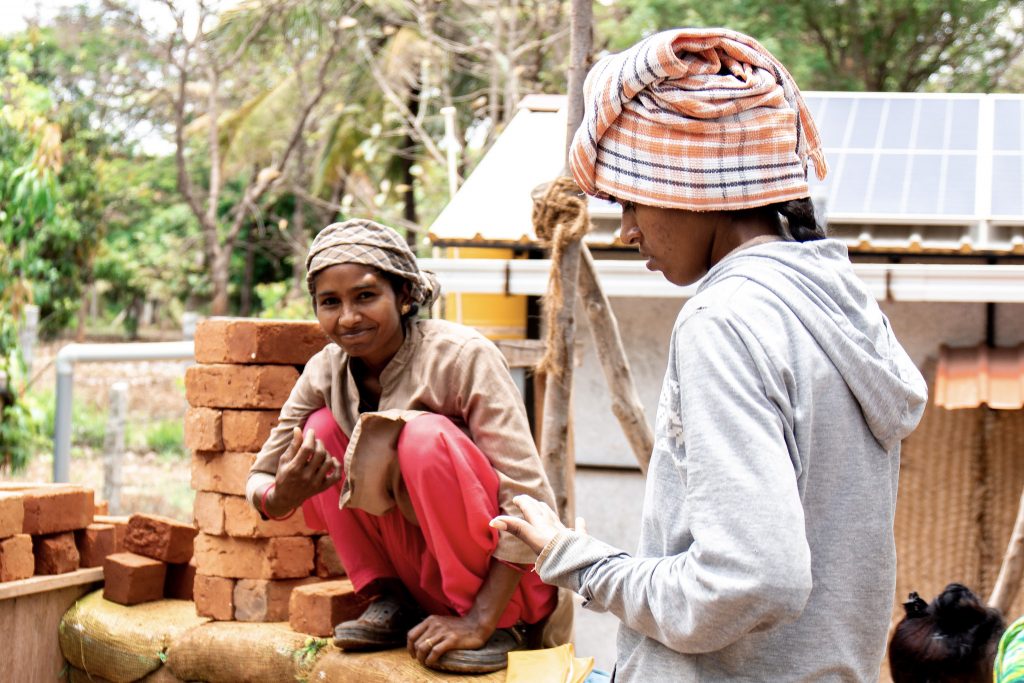
As we announce a new round of our INTBAU Grassroots grants for 2025, Jyoti Soni Dhanak, Chair of INTBAU India, sat down with the team from Grassroots grantee Masons Ink, a practice based in Bengaluru to discuss the project that received support in year one. This project supports women to acquire the skills, knowledge and resources to succeed in a field where there can face limited opportunities for technical advancement and leadership.
It is common to see women on construction sites in India. “When I worked abroad, I used to take pride in saying, ‘If you want to see women in construction, come to India. You’ll witness a completely different side of this industry,’” Says Jyoti. With over 20 years of experience across the UK, UAE, and India, she recognises how unique India’s approach is, though she acknowledges that there’s still progress to be made for true equality.
However, the role of women often lacks recognition and advancement, as they primarily work as helpers or labourers. In contrast, their male counterparts, who start at the same level, receive on-site training that enables them to progress into skilled masonry roles. The Upskilling and Training Initiatives for Women Masons project, led by Masons Ink, is tackling this disparity by providing women with the skills and knowledge to take on leadership roles in sustainable construction.
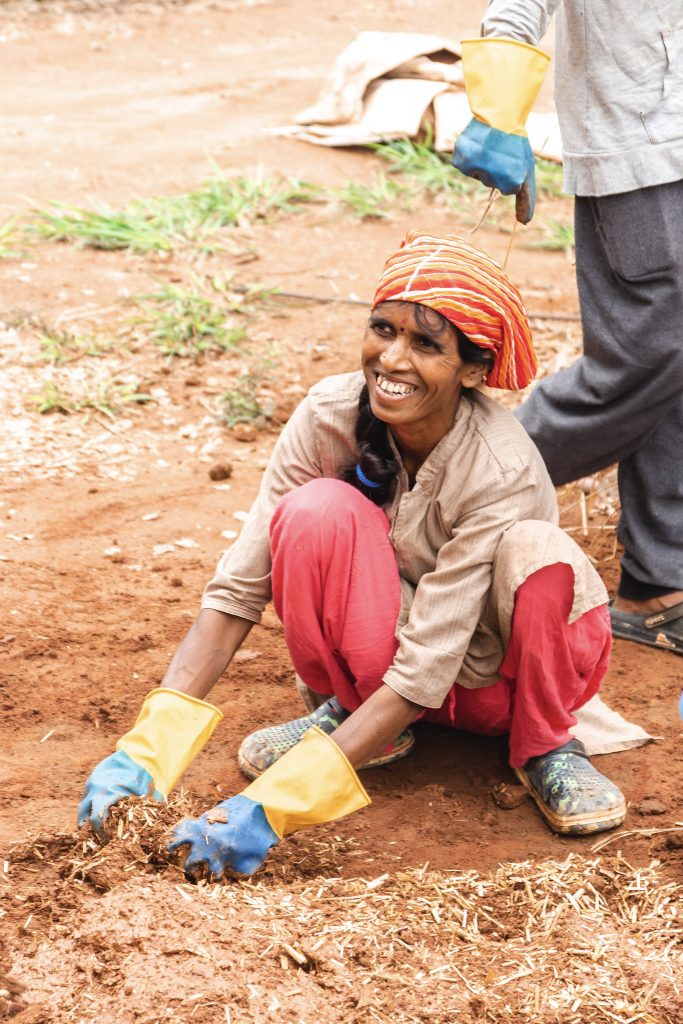
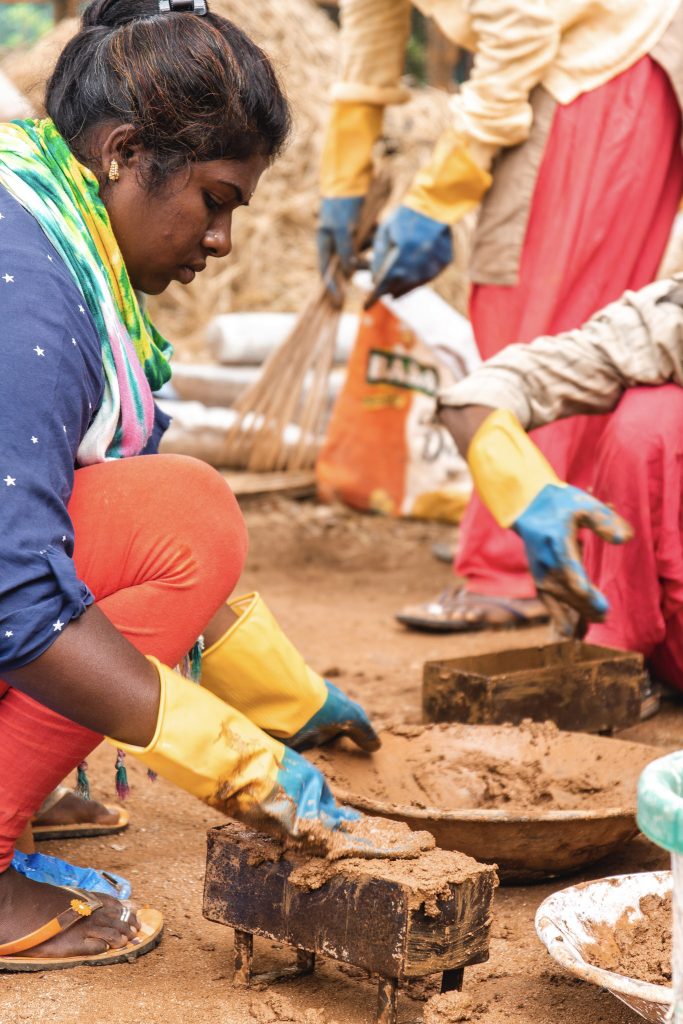
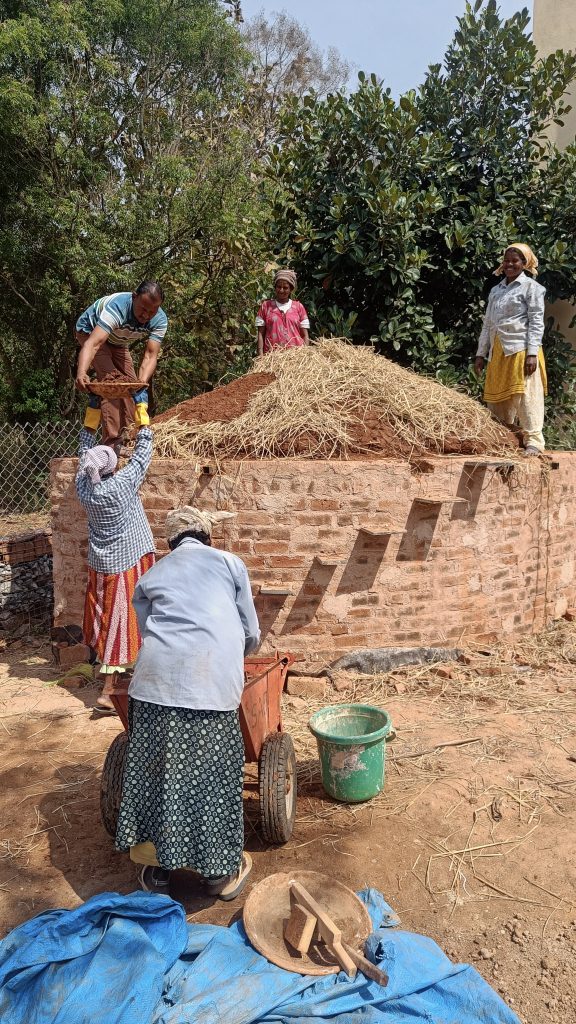
Pioneering sustainable techniques with an all-women team
This project is not just about upskilling women in construction; it also combines the use of sustainable materials like mud, bamboo, and lime. These natural materials are environmentally friendly and part of the vernacular building traditions but can often be perceived as outdated. Masons Ink is defying industry norms by creating opportunities for women to work with these materials while pushing sustainable practices in construction. The complexity of merging social empowerment and environmental responsibility has required innovative solutions and a commitment to overcoming obstacles.
Masons Ink was hired to build Cheerville, an eco-friendly residential project for Sindhoor Pangal. The house, located near the Karnataka-Tamil Nadu border, was envisioned as a model for sustainable construction. An all-women construction team, led by site architect Oviya, manages the construction. They’ve taken responsibility for the end-to-end process of the project, applying earth-based construction methods, bamboo structures and lime plastering. Many of these women, who were previously unskilled labourers, have now mastered skills traditionally reserved for men, transforming their roles in the process.
Their involvement not only elevates their professional status but also serves as a powerful example of how sustainable construction can be integrated with social empowerment, enabling marginalised communities to take charge of their future.
Impacting lives, educating and shaping community perceptions on traditional architecture and construction techniques
The idea of forming an all-women construction team came from Sindhoor, the project’s client. From the start, she wanted to break new ground—not only by using sustainable materials like mud but by having an all-women workforce lead the construction. Masons Ink embraced this vision, and together they turned it into reality.
“It was a kind of match made in heaven,” says Sridevi Changali, co-founder of Masons Ink. “We had been looking for a way to implement this, and when Sindhoor came to us with the idea of an all-women team, we knew this was the right moment.”
Initially, the community was sceptical. Mud construction is often associated with poverty, and many in the villages thought it was outdated. The women masons themselves feared they would be laughed at for working with a material seen as backward. However, as the project unfolded, attitudes began to change. Women masons who were once hesitant now bring their families to see what they’ve accomplished, showing off their new skills with pride.
“I get frequent visitors,” says Sindhoor. “The women bring their relatives, and others from nearby come to see what we’re doing. They’re interested in what’s going on here.”
The project’s success has sparked curiosity and even experimentation. People from surrounding villages have begun to try small sustainable projects of their own, such as cement-free ponds and water tanks. Although the shift in perception is slow, the seeds of change have been planted.
“It’s not a tectonic shift,” Sindhoor acknowledges, “but we’ve taken the first step, and now the challenge is inspiring more people to follow.”
The transformation within the women masons themselves has been profound. While they initially viewed the work as just another job, they now take pride in their accomplishments. Their confidence is growing, but there’s still much to do in terms of fostering professional growth. Social and cultural barriers continue to make it difficult for these women to see masonry as a viable long-term career path.
“We’ve realised that the social foundation for them to think of this as a career is missing,” Sindhoor reflects. “It’s something we’re working on, but it’s a long process.”
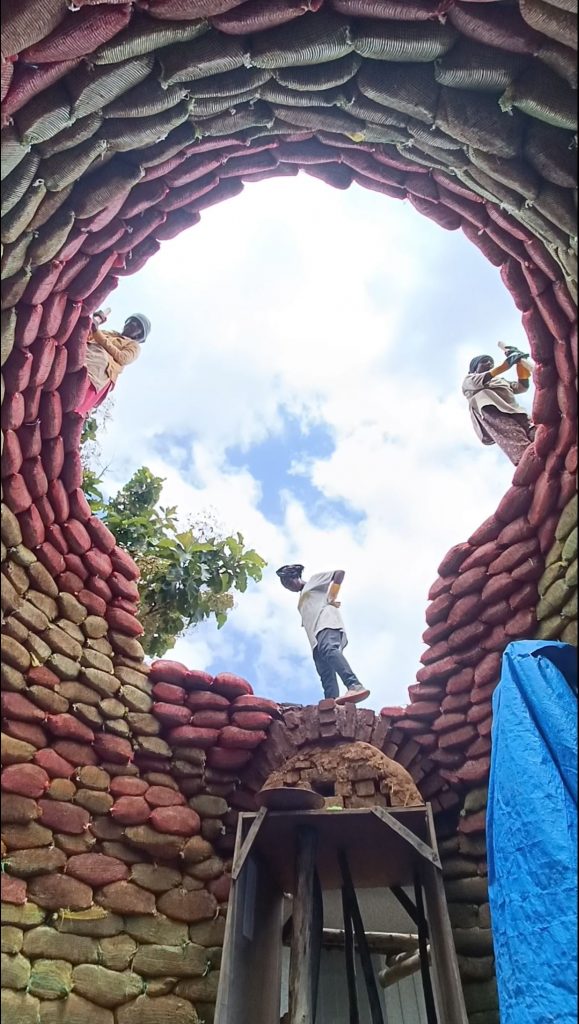
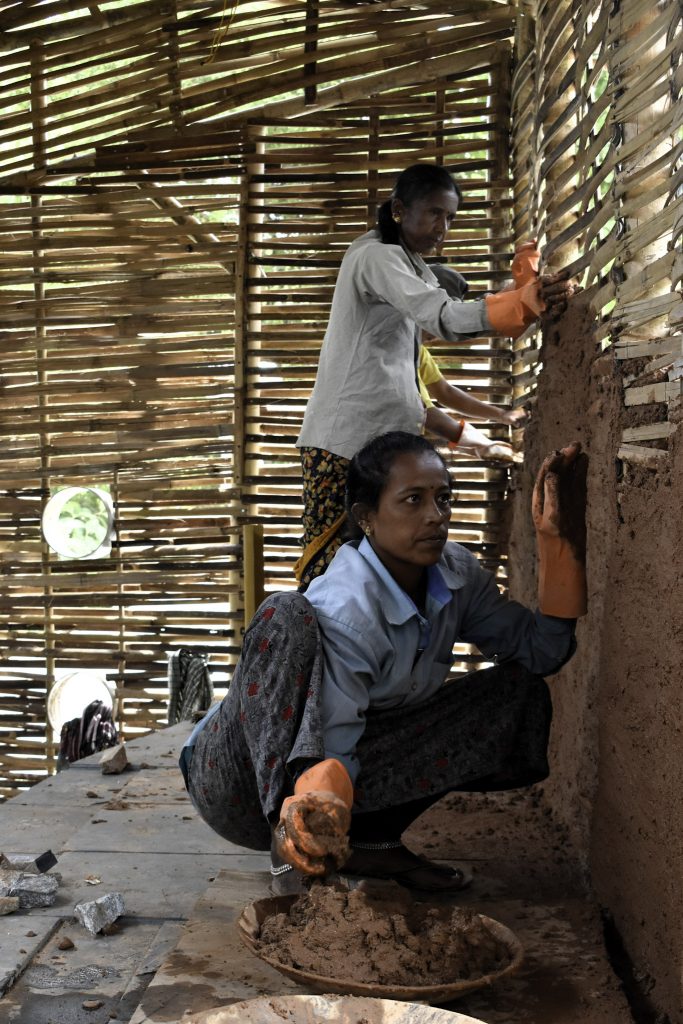
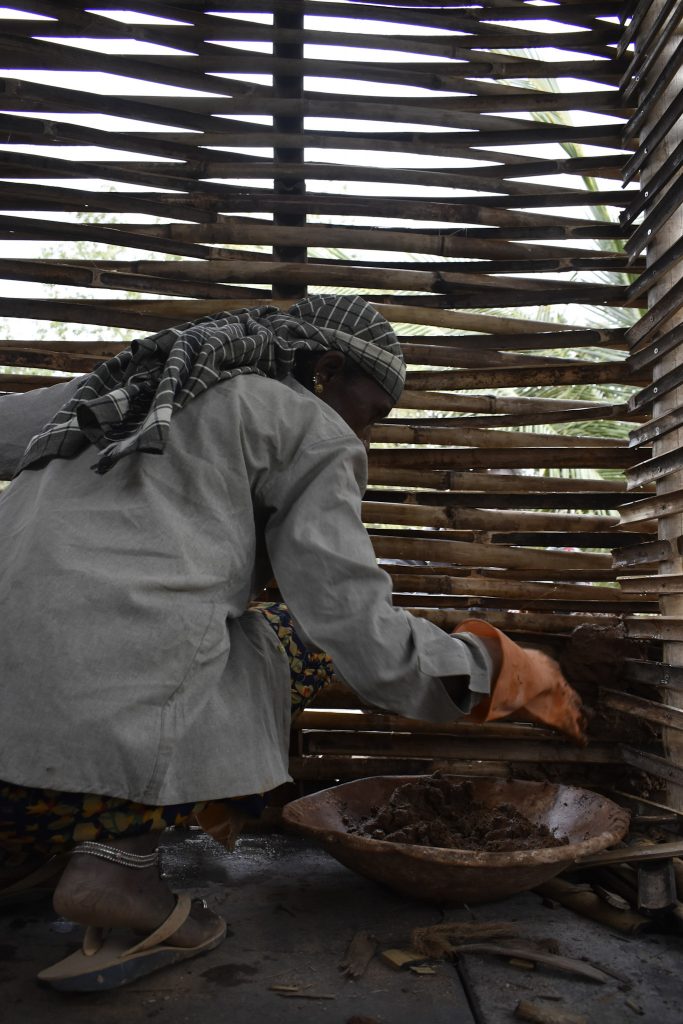
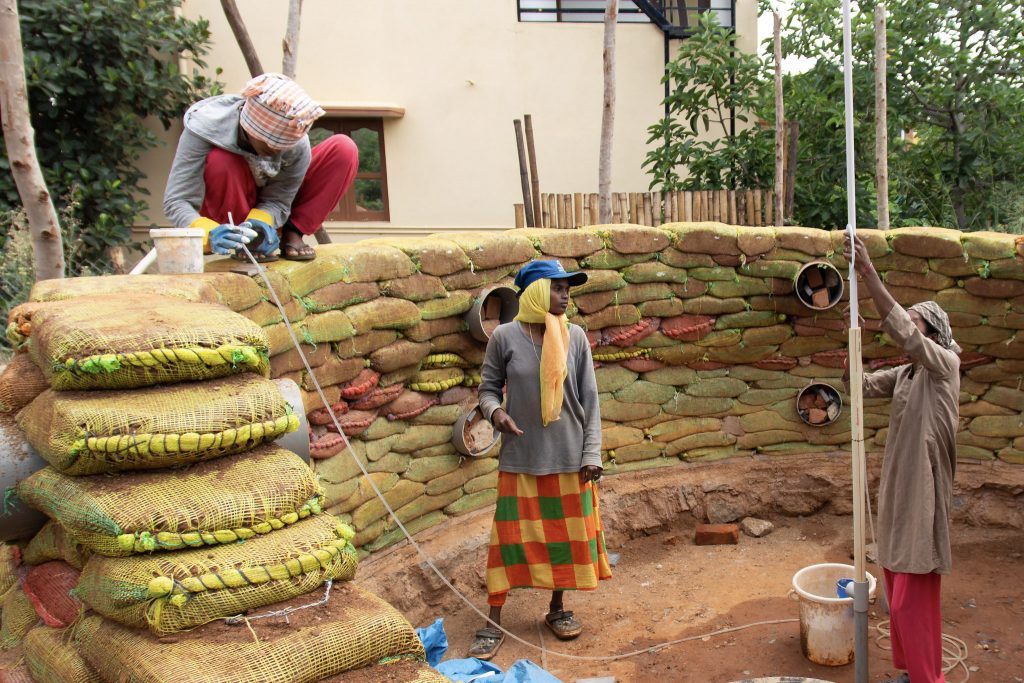
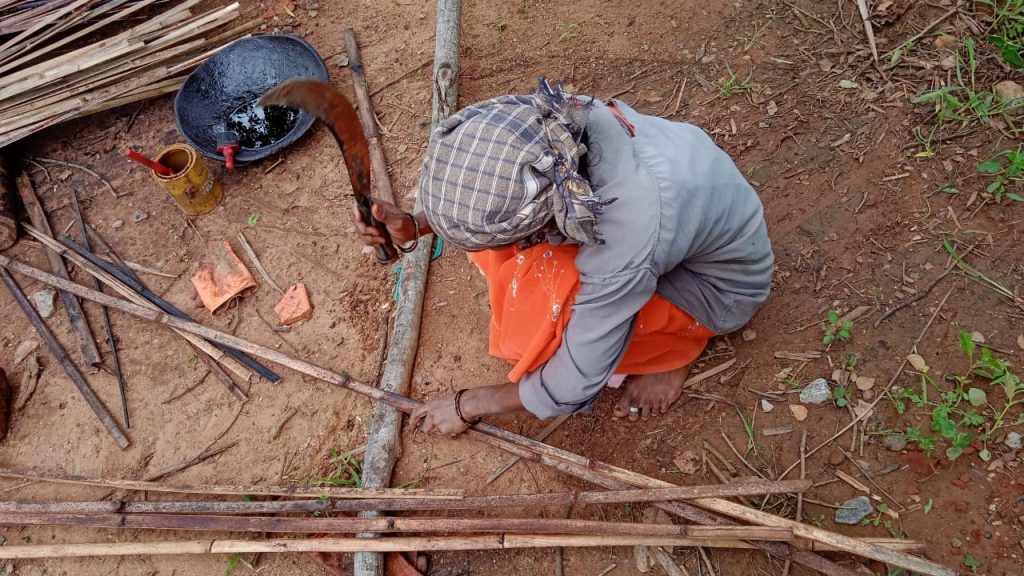
Adapting labour conditions for inclusivity and wellbeing
One of the most remarkable aspects of the project is the flexibility provided to meet the specific needs of the women masons on the team. Traditionally, construction work in India starts early in the morning, but this doesn’t align with the women’s roles as caregivers. Many of them have to cook, send their children to school, and manage their homes before they can head to the site. Recognising this, Sindhoor and Oviya adapted the working hours, making it easier for the women to balance their personal responsibilities with their professional work.
“We adjusted the work timings to accommodate their needs,” Sridevi explains. “We didn’t want to impose rigid schedules that would make it harder for them to contribute.”
A lunch programme was also introduced to address nutrition, as many of the women were not in good health despite their physical strength. The programme provided the nutritional support they needed to perform the physically demanding tasks on-site.
“We’re mindful of these additional gaps—like health and hygiene—that need to be addressed,” says Sindhoor.
This focus on inclusivity extends beyond the construction site. The project has shown that empowering women requires not only professional training but also a supportive environment that addresses the realities of their lives.
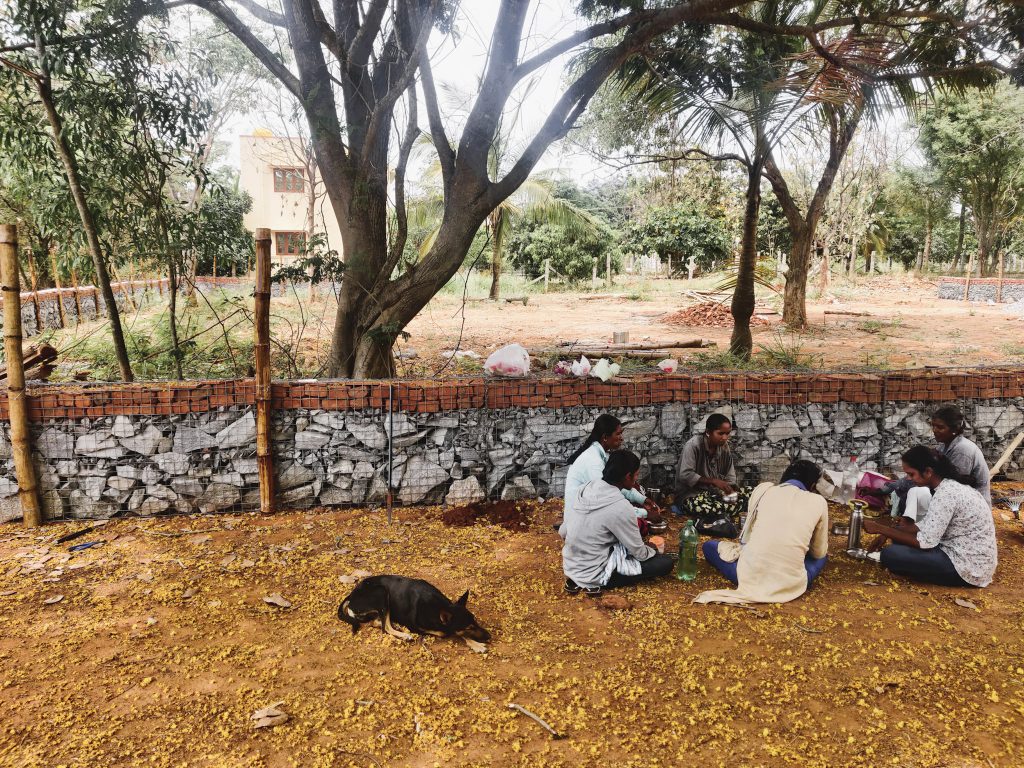
The Inspiration Behind Empowering Women
The drive to focus on upskilling women in construction came from a realisation Rosie and Sridevi had early in their careers. On one of their first projects, they saw women relegated to unskilled labour while their male counterparts were promoted to masons. Despite being integral to the process, the women were never considered for leadership roles.
“One of the women on site was managing all the finances, organising the team, and doing most of the work,” Sridevi recalls. “But culturally, she was still seen as just a helper.”
This experience sparked their desire to challenge these norms and make women a central part of their projects. Through research, grants, and outreach, they’ve found ways to train women for leadership roles in construction. Empowering women is now at the heart of Masons Ink’s mission.
“The paradox is that these women are already doing the hard labour—carrying bricks, bringing materials—but they’re not given the chance to build the walls,” Rosie adds. “That inequality is something we couldn’t ignore.”
Looking Ahead: Addressing challenges
As the project moves forward, the Masons Ink team is reflecting on the successes and challenges they have faced. Although the women have developed valuable skills and gained confidence, there are still deep-rooted social barriers that prevent many from viewing masonry as a long-term career option.
“We need to understand what’s stopping these women from moving forward,” Rosie says. “This project offers a unique opportunity for social research, and what we learn here could benefit similar initiatives.”
Another key focus for the future is documenting the techniques and lessons learned during the project. Sindhoor has committed to making the site a place for experimentation, and the team wants to document both the successes and failures to create resources for others looking to implement sustainable construction projects.
“We’ve tried different techniques, and we want to document them as honestly as possible so others can benefit from what we’ve learned,” says Sindhoor.
The INTBAU Grassroots Grant will support this next phase of research, documentation, and skill development. However, additional support from other organisations is needed. Local media coverage, mentorship for the site architect and the women in the team, and partnerships with NGOs specialising in financial literacy and leadership training could all help ensure the long-term success of the women involved. “Seeing the women on site, doing work traditionally reserved for men, and knowing they’re breaking cultural barriers is deeply inspiring,” adds Rosie.
“This project is about more than just construction,” Sridevi concludes. “It’s about empowering these women in every aspect of their lives.”
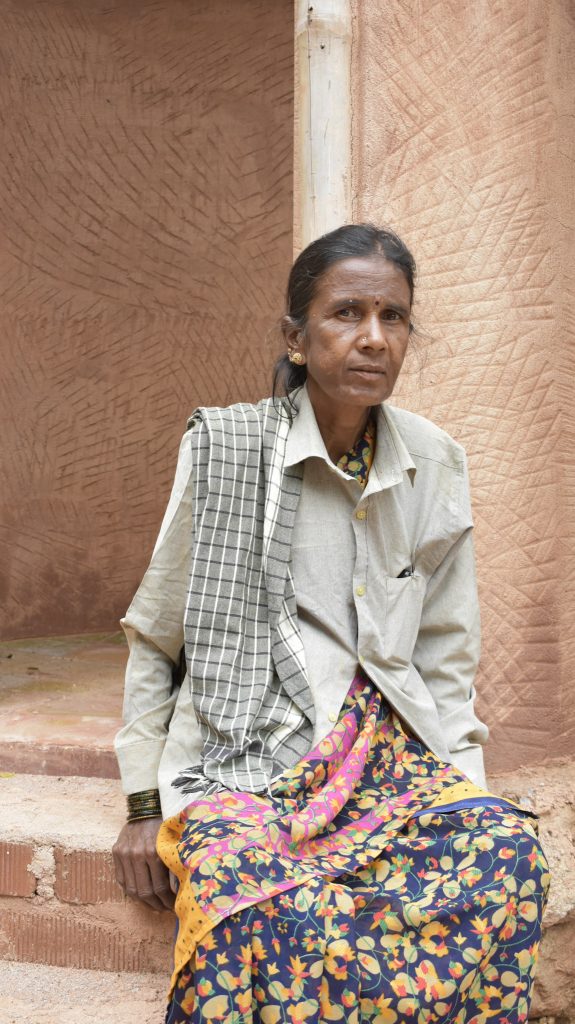
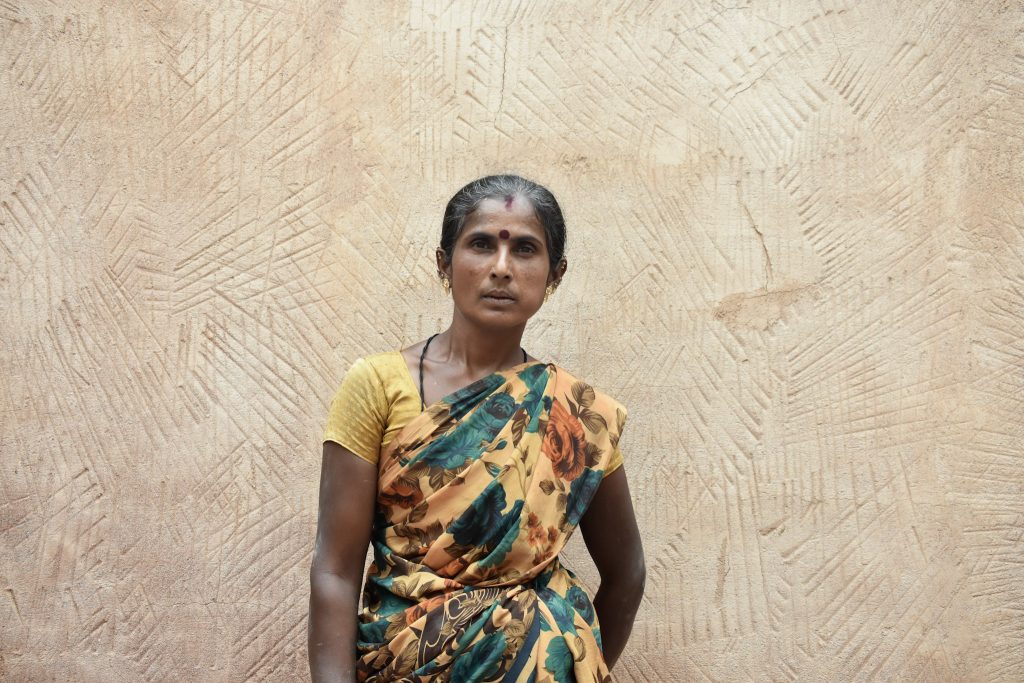
About Masons Ink and INTBAU India
Masons Ink was founded 10 years ago by Rosie Paul and Sridevi Changali. Combining Rosie’s expertise in earthen construction with Sridevi’s focus on heritage conservation, they saw an opportunity to create meaningful, sustainable solutions for India’s built environment. Their work is driven by three core pillars: sustainability, heritage conservation, and social architecture.
Before establishing Masons Ink, Rosie Paul served as the Head Architect at the Auroville Earth Institute, UNESCO representative for Earthen Architecture in South Asia. She holds a post-master’s degree in Earthen Architecture, Building Culture, and Sustainable Development from CRAterre in France, the UNESCO Chair for Earthen Architecture. Rosie specialises in energy-efficient buildings, focusing on earthen technology and cost-effective design. She is currently the issue lead on women and gender with Climate Heritage Network and has represented South Asia at the UN Climate Change Conference COP26, COP27 and COP28.
With a passion for heritage conservation, Sridevi Changali earned a degree in Historic Building Conservation from the University of York, UK. She has been associated with the Council for British Archaeology and the York Archaeological Trust. Sridevi worked with INTACH’s Pondicherry chapter as a project coordinator, playing a key role in revising the listing and grading of heritage buildings in Pondicherry. At Masons Ink, she leads the Heritage Wing and is involved in several heritage initiatives across India.
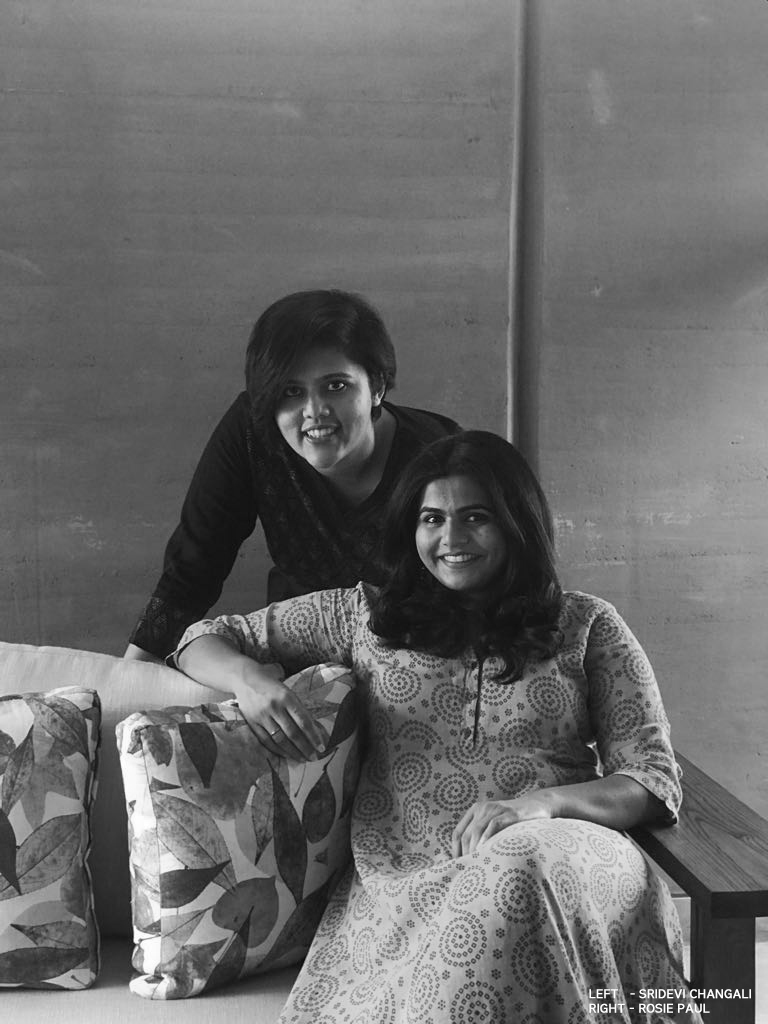
INTBAU India actively collaborates with educational, research, and policy-making institutions across the country to bridge the gap between academia and professional practice. In the past, the Chapter has partnered with INTBAU’s International Secretariat on key initiatives, such as a training programme under the Aluva Municipality Future Proofing proposal in Kerala, in collaboration with the British High Commission and Atkins. Additionally, INTBAU India and the International Secretariat, together with Habitat for Humanity International, developed a proposal for upgrading informal settlements in Pune/Pimpri-Chinchwad. Through these projects, INTBAU India demonstrates its commitment to resilient, inclusive design that addresses India’s unique social and environmental needs.
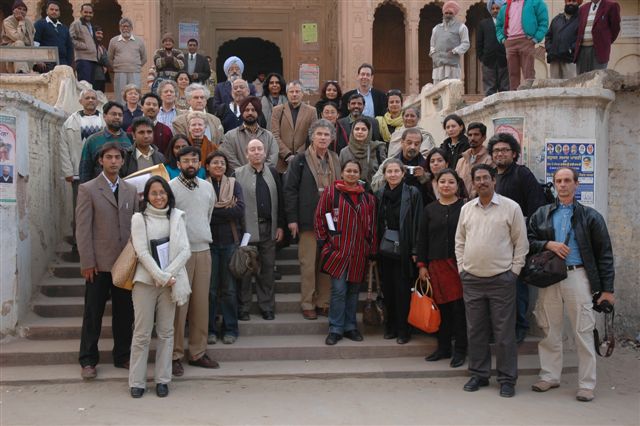
Jyoti Soni Dhanak is Chair and founding member of INTBAU India, as well as member of the Management Team of the INTBAU International Council Chapters. Jyoti brings over 20 years of experience in socially conscious and sustainable design. A strong advocate for women in architecture, she actively promotes inclusive and locally grounded design, supporting INTBAU’s mission to create resilient, beautiful places that reflect and develop traditional knowledge. Her leadership has guided impactful initiatives across cities like Aluva, Mumbai, and Delhi, where she champions approaches that address today’s architectural and social challenges. In her role at AtkinsRéalis, Jyoti combines technical expertise with a collaborative spirit to drive community-focused development that aligns with her commitment to sustainability and local identity.
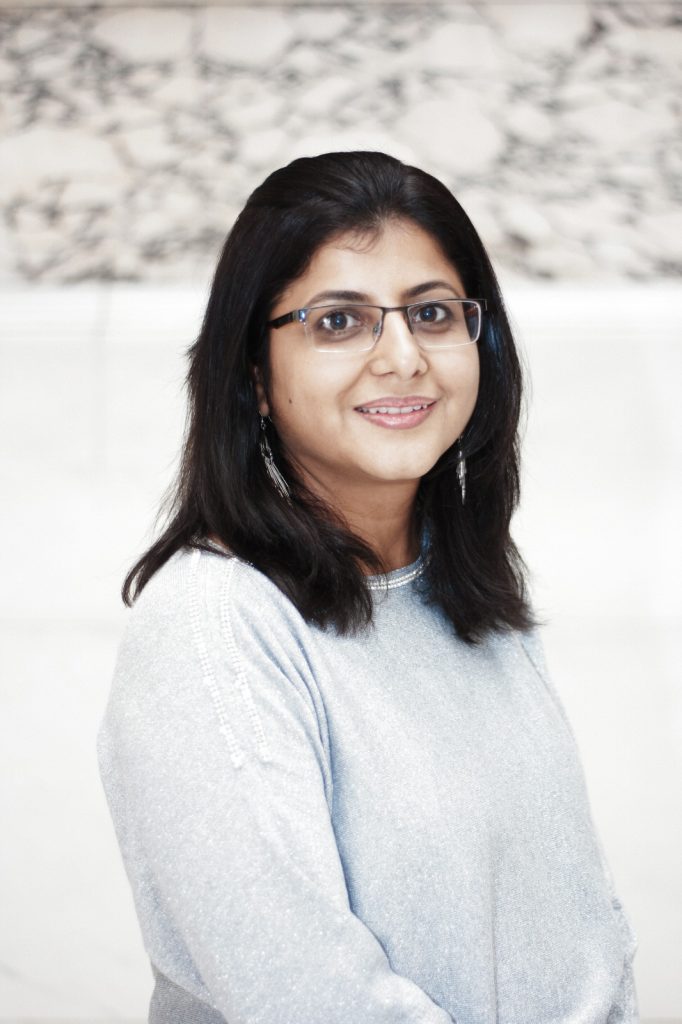
Learn more about the INTBAU Grassroots Grants Programme at: Grassroots | INTBAU
Author: Jyoti Soni Dhanak
Editing: Antonio Roberto Quiroz Soto
Photo credits: Masons Ink
